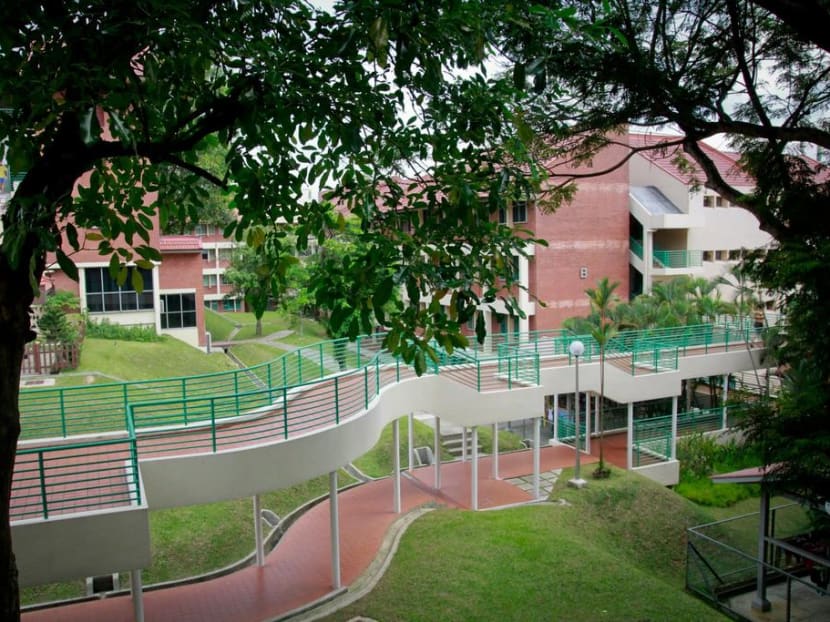A breakdown of the 56 sexual misconduct cases at local universities in last 3 years
SINGAPORE — There were 56 cases of sexual misconduct involving students from the six local universities in the last three years, 14 of which were committed off campus, Education Minister Ong Ye Kung told Parliament on Monday (May 6).

A view of the National University of Singapore's Eusoff Hall residence, where NUS undergraduate Monica Baey was filmed by a fellow student while she was showering last November.
SINGAPORE — There were 56 cases of sexual misconduct involving students from the six local universities in the last three years, 14 of which were committed off campus, Education Minister Ong Ye Kung told Parliament on Monday (May 6).
Of the 56 cases:
Twenty-five involved students from the National University of Singapore (NUS) and two involved students from Yale-NUS, which has its own Board of Discipline separate from NUS
Twenty were from Nanyang Technological University
Six were from the Singapore Management University
The Singapore University of Technology and Design (SUTD), Singapore Institute of Technology (SIT) and Singapore University of Social Sciences (SUSS) had one case each
In 37 of the cases, the victims made police reports.
Four cases are still under investigation, while there was insufficient evidence to make out offences in two cases.
Of the remaining 31 cases, 16 were prosecuted in court and 10 resulted in jail terms of between 10 days and eight months, said Law and Home Affairs Minister K Shanmugam. The cases which resulted in jail terms were for serious offences involving outrage of modesty or multiple instances of voyeurism, said Mr Ong.
Of the six who were not jailed, four were put on supervised probation, one received a discharge not amounting to an acquittal, and one case is awaiting sentencing.
Thirteen other offenders were given a conditional warning and two were given a stern warning. Of the 13 given conditional warnings, one re-offended. The student from NUS was sentenced to eight months’ jail and fined S$2,000 for both his offences committed in 2015 and 2017, said Mr Shanmugam.
The ministers were responding to questions from Members of Parliament (MPs) about the number of sexual harassment cases reported at the autonomous universities, and the adequacy of punishments.
The MPs’ questions came in the wake of a public outcry over how the NUS handled the case involving undergraduate Monica Baey, who was filmed while showering in the hostel.
Seventeen of the 56 cases occurred in the 2015 academic year, 18 occurred in the 2016 academic year and 21 occurred in the 2017 academic year.
Two-thirds — or 37 cases — were related to voyeurism, involving peeping toms or filming of victims in vulnerable positions, Mr Ong added.
Mr Ong said there was “no discernable trend” in number of sexual misconduct cases because the student population changes from year to year.
The rate of such cases per 1,000 students was between 0.2 and 0.21 in the last three academic years, he said.
The number of cases at each autonomous university was closely related to their student numbers, said Mr Ong.
HOW THE UNIVERSITIES RULED
On Monday, Mr Ong repeated his call for local autonomous universities to review their frameworks when handling cases of sexual misconduct. Penalties for egregious cases cannot be too lenient because they must balance deterrence with rehabilitation of the offender, he said.
Voyeurism is also on the rise, he noted.
Disclosing the penalties imposed by the local universities for the 56 cases, Mr Ong said:
Five cases are pending disciplinary hearings, while four students withdrew from the universities before sanctions were imposed.
Of the remaining 47 cases, 34 resulted in an official reprimand, 26 resulted in suspensions of up to two academic terms, and 20 were banned from entering students’ dorms.
The numbers do not add up to 47 because the offenders typically receive a combination of penalties, he said.
Of the 10 sexual misconduct cases that involved jail terms, one student was ordered to be expelled but this was later reduced to an 18-month suspension after the student appealed, and his psychiatric condition was taken into account, said Mr Ong, who did not elaborate on the condition.
Speaking after Mr Ong, Second Minister for Finance and Education Indranee Rajah addressed concerns about campus security. NUS has started installing full-height doors and partitions in the restrooms of its hostels and sports facilities, as well as more CCTV cameras on campus, she noted.
Institutes of higher learning are also taking steps to address new “threats”, such as miniature cameras, she said. For example, SUSS is collaborating with the police to train its security staff to inspect toilet cubicles or ceilings for the illegal installation of spy cameras.
SUPPORTING VICTIMS
On measures to support victims, Ms Indranee noted that NUS has set up a Victim Care Unit, while other universities have in place 24-hour helplines for incident reporting or counselling.
All institutes of higher learning have full-time counsellors to support victims. She said a “good support system” must create psychological safety for victims, guide them through the processes and protocols involved, provide updates on investigations and ensure that their concerns and questions are addressed throughout the journey.
Ms Indranee urged institutions and organisations to recognise that expectations of how they should respond to cases of sexual misconduct are changing in Singapore and globally.
“The #MeToo movement is an example. As societal norms and expectations change, all organisations need to keep up with the times, send clear signals that sexual misconduct is unacceptable, and equip themselves to deal with sexual misconduct complaints appropriately, should they arise,” she said.









